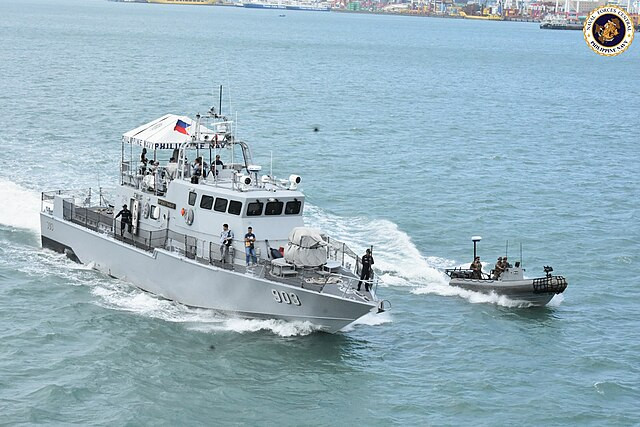In a development that underscores the ongoing territorial disputes in the South China Sea, the Philippine Coast Guard vessel BRP Teresa Magbanua has withdrawn from its position at Sabina Shoal after a tense five-month deployment. The withdrawal, confirmed by the National Maritime Council on Sunday, comes amid heightened tensions with China, which continues to assert its expansive claims over the strategic waterway despite international rulings against its stance.
The BRP Teresa Magbanua, a 97-meter coast guard ship, had been stationed at Sabina Shoal since April, tasked with asserting Manila's territorial claims and monitoring potential Chinese land reclamation activities. The shoal, located 140 kilometers from the Philippines' Palawan island and about 1,200 kilometers from China's Hainan island, has become a flashpoint in the broader South China Sea dispute, which involves overlapping claims from several Southeast Asian nations and China.
During its deployment, the Teresa Magbanua encountered significant challenges, including encirclement by a larger flotilla of Chinese vessels and harsh weather conditions. The vessel's bridge wing and freeboard sustained damage in a recent collision with a Chinese ship, one of several such incidents in the contested waters. Despite these challenges, the crew remained resolute in their mission, surviving on dwindling provisions as they maintained their presence at the shoal.
"During her deployment, she challenged an encirclement by a larger flotilla of intruders, battled inclement weather, with her crew surviving on diminished daily provisions," said Lucas Bersamin, Chairperson of the National Maritime Council, in a statement. He added that the Teresa Magbanua "carried out her sentinel duties against overwhelming odds."
The decision to withdraw the Teresa Magbanua has not been without controversy. Beijing has repeatedly demanded the removal of the Philippine vessel, labeling its presence as "illegal" and a violation of China's territorial sovereignty. Chinese officials have argued that the Philippines' actions infringe on their claims to the South China Sea, which they assert extends to nearly the entire region.
However, Philippine officials have made it clear that the withdrawal of the Teresa Magbanua is not a concession to Chinese demands but rather a temporary move necessitated by the need for repairs and resupply. A replacement vessel is already en route to Sabina Shoal, ensuring that Manila maintains its presence in the area.
"Another [vessel] will immediately take over," said Alexander Lopez, spokesperson for the National Maritime Council. "Definitely, we will keep our presence there."
The situation at Sabina Shoal has become increasingly volatile in recent weeks, with both Manila and Beijing accusing each other of intentional ramming incidents involving their respective vessels. These clashes occurred shortly after the two countries had reached an agreement on resupply missions to the Filipino naval ship beached at Second Thomas Shoal, another contentious location in the South China Sea.
The Teresa Magbanua's return to port follows high-level talks between Philippine and Chinese officials, during which the Philippines reiterated its position on Sabina Shoal. In contrast, China reaffirmed its demand for the vessel's withdrawal. Despite the diplomatic engagement, tensions remain high, with China's coast guard pledging to continue law enforcement activities in waters it claims as its own.
China's expansive claims in the South China Sea have long been a source of regional instability. In 2016, an international tribunal in The Hague ruled against China's "nine-dash line" claim, which Beijing uses to justify its control over the majority of the sea. The tribunal's decision, however, has been rejected by China, which continues to assert its sovereignty over the contested waters.
The South China Sea is not only a vital commercial waterway but also a region rich in natural resources, making it a critical area for the countries involved in the dispute. The Philippines, along with other Southeast Asian nations such as Vietnam, Malaysia, Brunei, and Indonesia, has consistently challenged China's claims, leading to frequent maritime confrontations.






